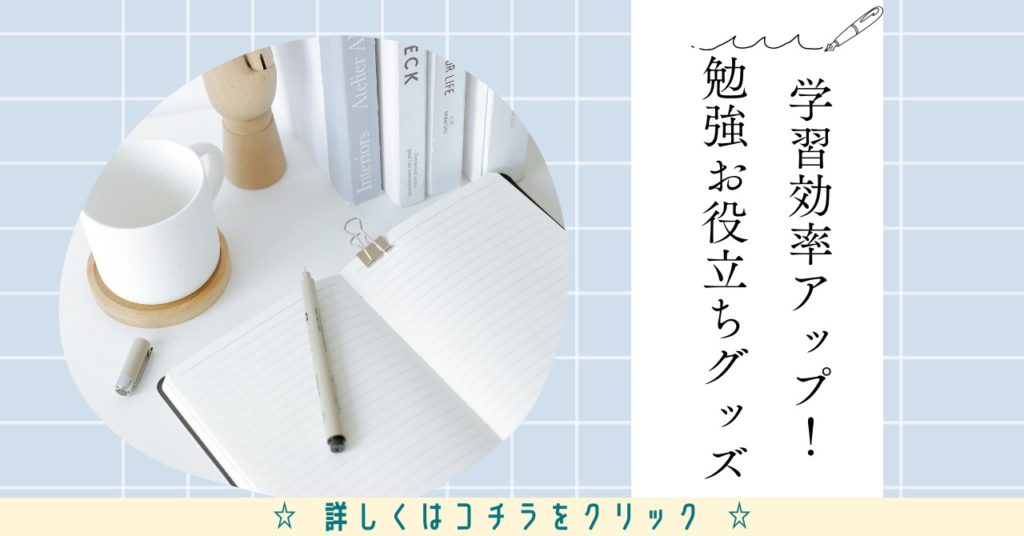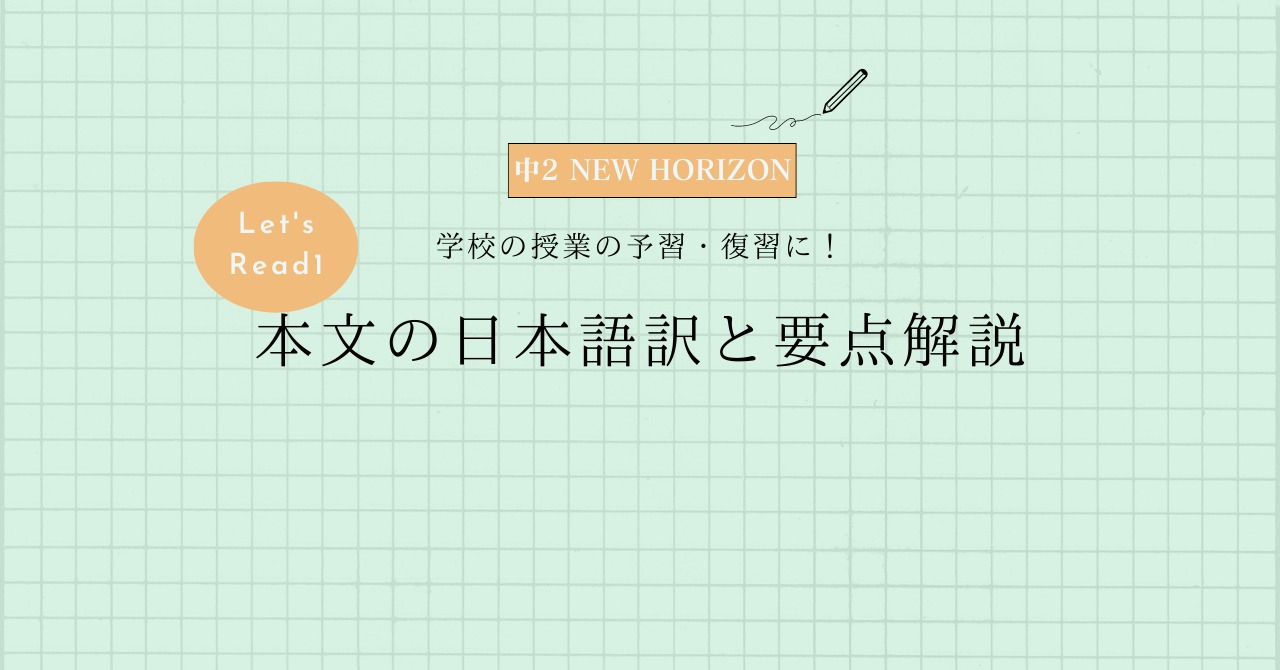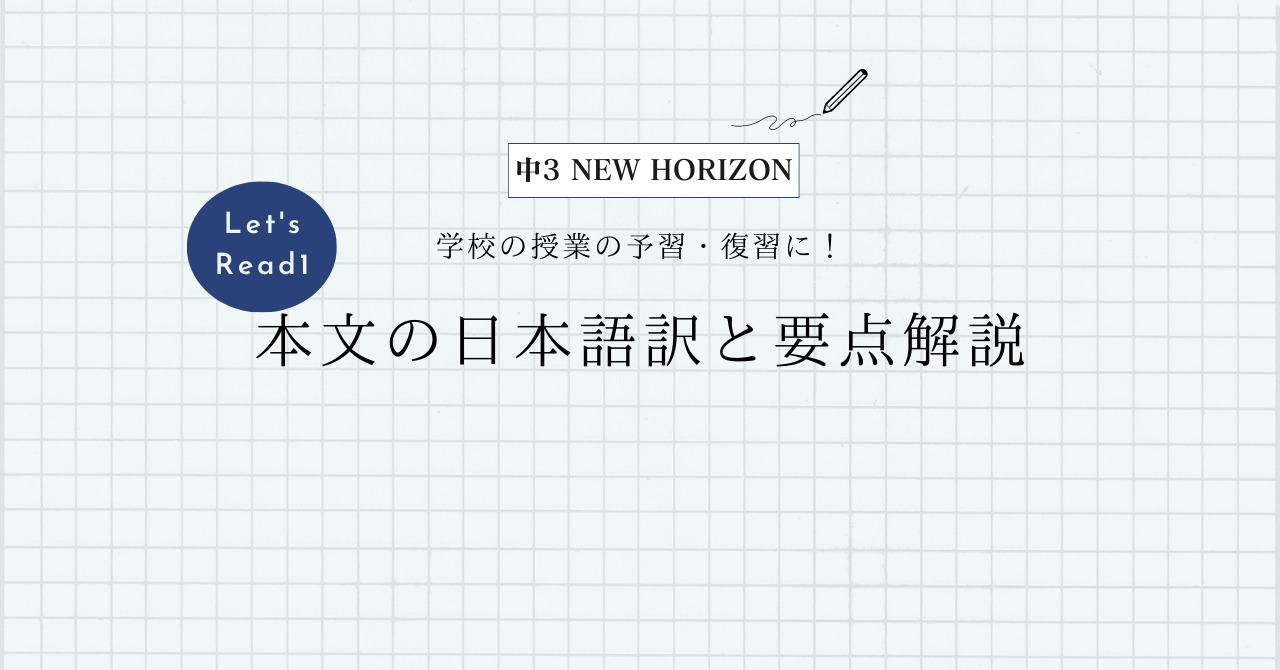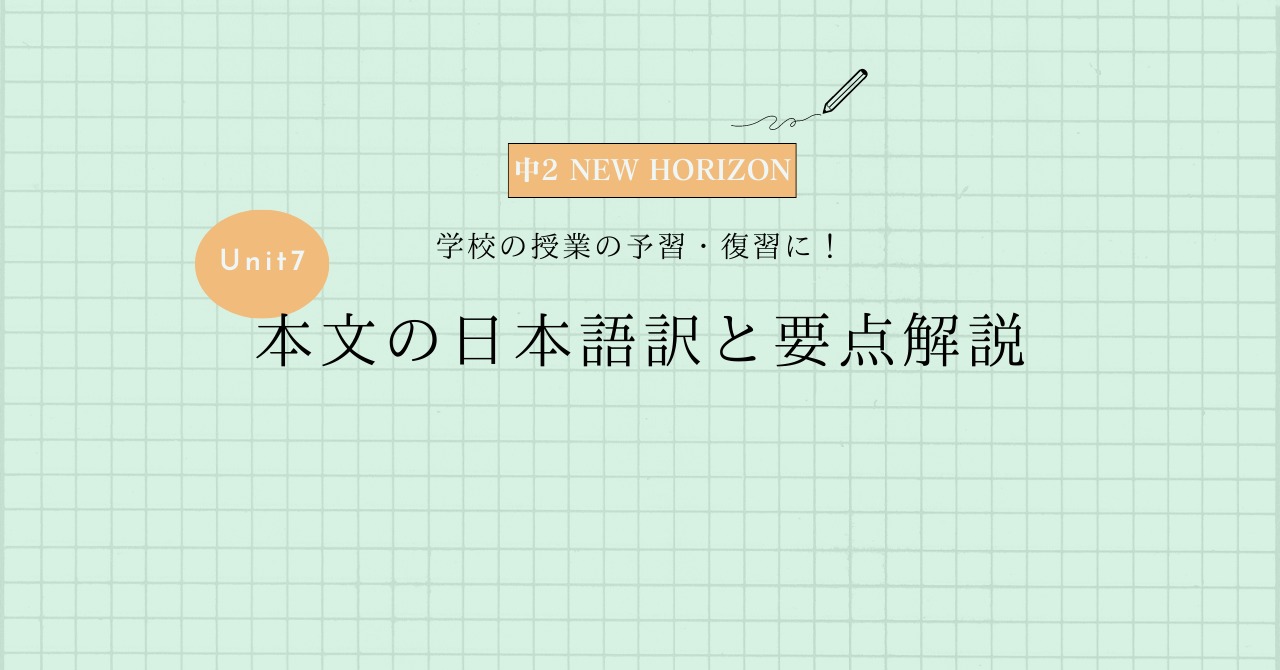東京書籍 中学2年生 NEW HORIZON(ニューホライズン) Let’s Read2の本文の日本語訳と重要箇所の解説です。
- Let’s Read2 本文と日本語訳
- Let’s Read2 重要事項の解説
- A Glass of Milk
- Once, a poor young boy was selling candy door-to-door.
- He was earning money to go to school.
- He was very hungry, but he had only a few coins.
- The boy went to a house to sell candy.
- She was not well-off herself.
- When the boy was about to leave, the woman said, “Wait.”
- She felt sorry for him because he looked very hungry.
- So she brought him a glass of milk.
- When he finished drinking the milk, the boy felt much better.
- He took the coins out of his pocket, and said, “Thank you for the milk.”
- The woman replied, “You don’t need to pay. We don’t need money for kindness.”
- Before he left, she said, “Be strong, young man, and you’ll have a great future.”
- Thanks to her kindness, the boy felt stronger than before, and walked away with a smile.
- After that day, the woman sometimes wondered about the boy.
- She hoped he was doing well.
- The years went by and the woman got old.
- One day, she felt ill and fell down in front of her house.
- The local doctor could not help her, so he sent her to a big hospital in the city.
- The doctors had to give her an operation right away.
- When she woke up, she was happy to be alive.
- Then she realized, “I have no money for this operation. What should I do?”
- He had an envelope in his hand.
- He gave it to her and said, “Here’s your bill for the operation.”
- She was afraid to look inside.
- Inside there was a note.
- It said, “Paid in full, with one glass of milk.”
- Then she looked up and recognized the boy in the doctor.
- Let’s Read2 まとめ
Let’s Read2 本文と日本語訳
A Glass of Milk 「コップ1杯の牛乳」
Once, a poor young boy was selling candy door-to-door.
「かつて,1人の貧しい若い少年が戸別にキャンディを売っていました。」
He was earning money to go to school.
「彼は学校に行くためにお金を稼いでいました。」
He was very hungry, but he had only a few coins.
「彼はとてもお腹がすいていましたが,数枚の硬貨しか持っていませんでした。」
The boy went to a house to sell candy.
「少年はキャンディを売るために1軒の家に行きました。」
He knocked on the door and a woman opened it.
「彼がドアをノックすると,1人の女性がドアを開けました。」
She said, “I have no money for candy.”
「彼女は『キャンディを買うお金はないわ。』と言いました。」
She was not well-off herself.
「彼女は裕福ではありませんでした。」
When the boy was about to leave, the woman said, “Wait.”
「少年が去ろうとしているとき,女性が『待って。』と言いました。」
She felt sorry for him because he looked very hungry.
「彼がとてもお腹がすいていそうに見えたので,彼女は彼を気の毒に思いました。」
So she brought him a glass of milk.
「だから彼女は彼にコップ1杯の牛乳を持ってきました。」
When he finished drinking the milk, the boy felt much better.
「彼は牛乳を飲み終えると,気分がずっと良くなりました。」
He took the coins out of his pocket, and said, “Thank you for the milk.”
「彼はポケットから硬貨を取り出して,『牛乳をくれてありがとうございます。』と言いました。」
The woman replied, “You don’t need to pay. We don’t need money for kindness.”
「女性は『支払う必要はないわ。親切にお金は必要ないの。』と答えました。」
Before he left, she said, “Be strong, young man, and you’ll have a great future.”
「彼が立ち去る前に,彼女は『強くなってね,若い人。そうすれば素晴らしい未来が待っているわ。』と言いました。」
Thanks to her kindness, the boy felt stronger than before, and walked away with a smile.
「彼女の親切のおかげで,少年は前よりも強くなったと感じ,にっこり笑って立ち去りました。」
After that day, the woman sometimes wondered about the boy.
「その日の以降,女性は時々その少年のことを思いめぐらすようになりました。」
She hoped he was doing well.
「彼女は,彼が順調にやっていることを願いました。」
The years went by and the woman got old.
「数年が経ち,女性は年を取りました。」
One day, she felt ill and fell down in front of her house.
「ある日,彼女は具合が悪くなって,家の前で倒れました。」
The local doctor could not help her, so he sent her to a big hospital in the city.
「地元の医者は彼女を助けることができなかったので,彼は町の大きな病院まで彼女を送りました。」
The doctors had to give her an operation right away.
「医者たちはすぐに手術を行わなければなりませんでした。」
When she woke up, she was happy to be alive.
「彼女が目覚めたとき,生きていることに喜びを感じました。」
Then she realized, “I have no money for this operation. What should I do?”
「それから彼女は『私にはこの手術のお金がない。どうすべきかしら?』と気づきました。」
The next day, a doctor came to her room.
「翌日,1人の医者が彼女の部屋に来ました。」
He had an envelope in his hand.
「彼は手に封筒を持っていました。」
He gave it to her and said, “Here’s your bill for the operation.”
「彼はそれを彼女に渡して,『これが手術の請求書です。』と言いました。」
She was afraid to look inside.
「彼女は中身を見るのを怖がりました。」
He smiled and said, “Open it, please.”
「彼は笑って,『開けてください。』と言いました。」
Inside there was a note.
「中には,メモが入っていました。」
It said, “Paid in full, with one glass of milk.”
「そこには『コップ1杯の牛乳で,全額支払い済み』と書かれていました。」
Then she looked up and recognized the boy in the doctor.
「それから彼女は顔を上げて,その医者が少年だと気づきました。」
Round1
並び替え:E→F→A→C→B→D
Round2
➀Did the woman buy any candy from the boy?
No, she didn’t.
②How did the boy feel when he left the woman’s house?
He felt stronger than before.
➂What did the woman worry about when she woke up from the operation?
She worried about money for it.
④A doctor gave the woman an envelope. Who was that doctor?
He was a poor young boy.

Let’s Read2 重要事項の解説
A Glass of Milk
“milk”などの液体は数えられない名詞(不可算名詞)なので,数を表現するときは特定の名詞を使って表現します。
“milk”は“glass(コップ)”に入れるのが普通なので,1杯なら“a glass of milk”,2杯以降なら“two glasses of milk”と表します。
複数にするときは,前で使っている名詞を複数形にしてあげます。
Once, a poor young boy was selling candy door-to-door.
“once”は「かつて」という副詞になります。
また,この文は「過去進行形」が使われていますね。
“poor”は「貧しい」という形容詞で,“sell”は「を売る」という動詞です。
“door-to-door“は「戸別に」という表現ですね。
He was earning money to go to school.
この文も「過去進行形」が使われていますね。
“earn”は「を稼ぐ」という動詞で,“to go”は「不定詞の副詞的用法」になります。
He was very hungry, but he had only a few coins.
“only”は「たった~だけ,~しか」といった強調を表す副詞です。
“a few”は「少しの,2,3の」という意味で,後ろには数えられる名詞(可算名詞)が来ますよ。
ちなみに数えられない名詞(不可算名詞)の場合は“a little”になります。
“coin”は「硬貨,コイン」という名詞です。
The boy went to a house to sell candy.
“to sell”は「不定詞の副詞的用法」になります。
She was not well-off herself.
“well-off”は「裕福な」という形容詞です。
“herself”などの“~self”という単語は再帰代名詞と言い,単語の直後や文頭・文末に置くことで強調する役割があります。今回は“She”が強調されて「彼女自身」ということです。
When the boy was about to leave, the woman said, “Wait.”
この文では「接続詞when」が使われていますね。
“be about to 動詞の原形”は「~しようとしている」という意味になります。
“leave”は「出発する,去る」といった,「ある場所から離れる」というイメージを持つ動詞です。訳は文章に応じて柔軟に変えてあげましょう。
また,「を置き忘れる,残す,ままにする」といった意味もありますよ!
“wait”は「待つ」という動詞ですね。
She felt sorry for him because he looked very hungry.
この文では「接続詞because」が使われていますね。
“felt”は“feel(感じる)”の過去形で,“sorry”は「申し訳なく思う,気の毒に思う」といった形容詞になります。
“look 形容詞”は「~に見える」という重要表現です。
So she brought him a glass of milk.
“so”は「だから」という接続詞ですね。“brought”は“bring(を持ってくる)”の過去形です。
“bring 人 もの”で「人にものを持ってくる」となって,“bring もの to 人”でも同じ意味になります。
他には“show”, “teach”, “tell”, “give”などが同じ使い方をできるので必ず書き換えられるようにしておきましょう。
When he finished drinking the milk, the boy felt much better.
この文では「接続詞when」が使われていますね。
“finish”は「を終える」という動詞で,後ろに「~すること」という形で動詞を入れる場合は必ず「動名詞」にします!
“feel better”は「気分がより良くなる」という意味で,“much”は「比較級」の強調に使うことができ,意味は「ずっと」となります。
He took the coins out of his pocket, and said, “Thank you for the milk.”
“took”は“take(を取る,を持っていく,連れていく)”の過去形です。
“out”は「外に」という副詞ですね。
The woman replied, “You don’t need to pay. We don’t need money for kindness.”
“reply”は「と答える」,“pay”は「払う」という動詞です。
“need”は「を必要とする」という動詞で,“need to 動詞の原形”は「不定詞の名詞的用法」になります。
“kindness”は「親切」という名詞ですね。
Before he left, she said, “Be strong, young man, and you’ll have a great future.”
この文では「接続詞before」が使われていますね。
“strong”は「強い」という形容詞になります。
また,“命令文,and(or)~”で「…しなさい。そうすれば(そうしないと)~」という重要表現です。
“and”で繋ぐとポジティブな内容が続き,”or”で繋ぐとネガティブな内容が続きます。
Thanks to her kindness, the boy felt stronger than before, and walked away with a smile.
“thanks to~”は「~のおかげで」という重要表現です。
また,この文では「比較級」が使われていますね。
“walk away”は「立ち去る」,“with a smile”は「にっこりと笑って,笑顔で」といった意味です。
After that day, the woman sometimes wondered about the boy.
“after”は「~の後で」という前置詞です。“wonder”は「思いめぐらす」という動詞ですね。
“sometimes“は「時々」という意味の頻度を表す副詞です。他には“usually(普段は)”,“often(よく)”,“always(いつも)”,“never(絶対にない)”などがあります。
頻度の感覚としては,always(100%)>usually(90%)>often(70%)>sometimes(50%)>never(0%)といった具合になります。
また,頻度を表す副詞はどこに置くのかも重要です。置く位置は,文章で使われている動詞によって変化します。
一般動詞の場合はその前,be動詞の場合はその後ろに置きます。以下に例文を挙げておきます。
一般動詞:I usually play soccer on Saturdays.「土曜日にたいていサッカーをする」
be動詞:He is often sleepy.「彼はよく眠そうにしている」
She hoped he was doing well.
“hope”は「を望む,願う」という動詞です。また,「接続詞that」が省略されていますね。
“that”以下は「過去進行形」になっていて,“do well”で「順調にやる」となります。
The years went by and the woman got old.
“go by”は「(時が)過ぎる,のそばを通る」という意味です。
“get”は形容詞と組み合わせることで「~になる」という意味にもなります。
One day, she felt ill and fell down in front of her house.
“one day”は「ある日」という意味です。
“ill”は「具合が悪い」という形容詞で,“sick”と同じ意味になりますね。
“fell”は“fall(落ちる)”の過去形で,“fall down”で「転ぶ」という意味です。
“in front of~”は「~の前に」という重要表現です。必ず覚えておきましょう!
The local doctor could not help her, so he sent her to a big hospital in the city.
“local”は「地元の」という形容詞になります。“could”は助動詞“can”の過去形ですね。
“sent”は“send(を送る)”の過去形です。
“send 人 もの”で「人にものを送る」となって,“send もの to 人”でも同じ意味になります。
他には“show”, “teach”, “tell”, “give”などが同じ使い方をできるので必ず書き換えられるようにしておきましょう。
The doctors had to give her an operation right away.
“had to 動詞の原形”は“have to~”の過去形で,「~しなければならなかった」となります。
“give 人 もの”で「人にものをあげる」となって,“give もの to 人”でも同じ意味になります。
他には“show”, “teach”, “tell”, “send”などが同じ使い方をできるので必ず書き換えられるようにしておきましょう。
“operation”は「手術」という名詞で,“right away”は「すぐに」という表現ですね。
When she woke up, she was happy to be alive.
この文では「接続詞when」が使われていますね。
“woke”は“wake(目を覚ます)”の過去形で,基本的には“wake up(目が覚める)”の形で使います。
ちなみに“get up”は「ベッドや布団から出て起きる」というニュアンスで,“wake up”は「ただ目を覚ましただけ」というニュアンスです。
また,“to be”は「不定詞の副詞的用法」になっていますね。“alive”は「生きている」という形容詞です。
Then she realized, “I have no money for this operation. What should I do?”
“then”は「それから,そのとき,それでは」といった意味の副詞です。文に応じて柔軟に訳してあげてください。
“realize”は「と気づく,を悟る」という動詞ですね。
“should”は「~すべきだ,~はずだ」という助動詞になります。
He had an envelope in his hand.
“envelope”は「封筒」という名詞ですね。
He gave it to her and said, “Here’s your bill for the operation.”
“Here’s~”は「~がある,これが~だ」といった意味になります。
“bill”は「請求書」という名詞です。
She was afraid to look inside.
“afraid”は「怖い」という形容詞ですね。“inside”は「内側に」という副詞です。
また,“to look”は「不定詞の副詞的用法」になっていますね。
Inside there was a note.
この文では「there構文」が使われていますね。
“note”は「メモ」という名詞です。
It said, “Paid in full, with one glass of milk.”
“It”は“a note”を指しています。
また,“said”は“say(言う)”の過去形ですが,手紙や新聞などを主語にして「~と書いてある」という意味で使うこともできます。
“paid”は「支払い済みの」という形容詞で,“in full”は「全部」です。
“with”は前置詞で「~と一緒に」と訳すことが多いですが,必ずしも後ろに人が来るわけではありません。イメージとして「~とセットで」と覚えておきましょう。
訳し方としては「~を使って」「~で」など文脈に合わせて柔軟に変えてあげましょう。
Then she looked up and recognized the boy in the doctor.
“look up”は「見上げる」という意味ですね。
“recognize”は「を認識する」という動詞になります。この部分は直訳すると「医者の中に少年を認識した」となり,つまり「医者が少年だと分かった」といった意味合いになりますね。

Let’s Read2 まとめ
以上がLet’s Read2の日本語訳となります。
ここでは今までに習った文法がたくさん使われていますね。どれも大切な文法なのでしっかり理解していきましょう!
何か分からない点や他に解説してほしい点があれば,お気軽にコメントしてください!





コメント